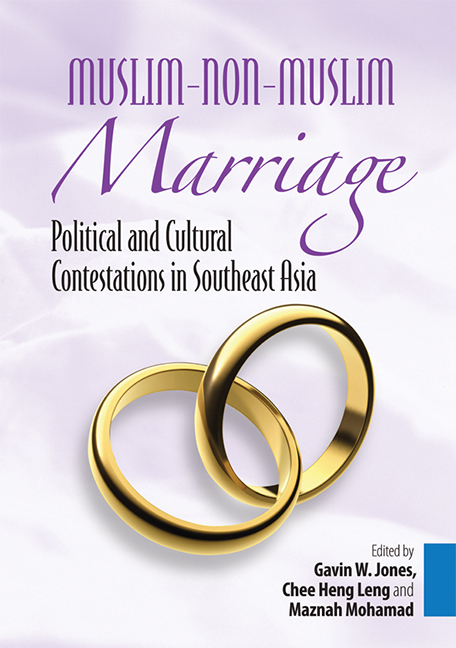Book contents
- Frontmatter
- Contents
- Preface
- The Contributors
- Glossary
- Introduction
- SECTION I Political and Legal Contestations
- Chapter 2 Trapped between Legal Unification and Pluralism: The Indonesian Supreme Court's Decision on Interfaith Marriage
- Chapter 3 Private Lives, Public Contention: Muslim-non-Muslim Family Disputes in Malaysia
- Chapter 4 Legal Aspects of Muslim-non-Muslim Marriage in Indonesia
- Chapter 5 The Politico-Religious Contestation: Hardening of the Islamic Law on Muslim-non-Muslim Marriage in Indonesia
- SECTION II Lived Realities
- SECTION III Perspectives
- Index
Chapter 4 - Legal Aspects of Muslim-non-Muslim Marriage in Indonesia
from SECTION I - Political and Legal Contestations
Published online by Cambridge University Press: 21 October 2015
- Frontmatter
- Contents
- Preface
- The Contributors
- Glossary
- Introduction
- SECTION I Political and Legal Contestations
- Chapter 2 Trapped between Legal Unification and Pluralism: The Indonesian Supreme Court's Decision on Interfaith Marriage
- Chapter 3 Private Lives, Public Contention: Muslim-non-Muslim Family Disputes in Malaysia
- Chapter 4 Legal Aspects of Muslim-non-Muslim Marriage in Indonesia
- Chapter 5 The Politico-Religious Contestation: Hardening of the Islamic Law on Muslim-non-Muslim Marriage in Indonesia
- SECTION II Lived Realities
- SECTION III Perspectives
- Index
Summary
No legal issue has generated more controversy over a longer period in Indonesia than interreligious marriage. The Dutch first addressed the issue with a decree promulgated shortly after the first settlement in Batavia that prohibited all marriages between Christians and non-Christians. As the number of Europeans in the Indies increased, the effort to prevent cross-racial marriages was replaced with rules designed to regulate its consequences. Thus, under Dutch law that became Indonesian law upon independence, difference of religion was expressly stated not to be an impediment to marriage. This rule remained in effect for nearly three decades until the passage of the national marriage law in 1974.
The 1974 Marriage Law does not address interreligious marriage directly, and for many years the permissibility of marriage across religious lines was uncertain. This uncertainty has now been largely resolved. It is now generally accepted that marriage between persons of different religions is not allowed under Indonesian law. But while there is broad agreement in both the legal community and the public at large that the law prohibits marriage between persons of different religions, the legal authorities are far less certain on the issue. The difficulty in contracting interreligious marriage in Indonesia is based more on the actions of conservative Muslim groups in condemning marriages between Muslims and non-Muslims than it is on the application of law.
COLONIAL HERITAGE
The regulation of Muslim-non-Muslim marriage in contemporary Indonesia is shaped by the legacy of Dutch law. A brief summary of colonial marriage law is, therefore, necessary in order to understand the current situation.
The key fact about the law of the Netherlands Indies as it relates to contemporary regulation of marriage is that the law was personal rather than territorial (Gautama 1991). The law that governed a particular transaction depended on the “law group” to which the person belonged. The three recognized law groups were, first, “Europeans”, which included Dutch and other Europeans, but also Japanese and nationals of other countries whose family law was similar to that of the Netherlands; second, “foreign Orientals”, which was comprised principally of Chinese, Arabs, and South Asians; and third, indigenous Indonesians.
- Type
- Chapter
- Information
- Muslim-Non-Muslim MarriagePolitical and Cultural Contestations in Southeast Asia, pp. 102 - 138Publisher: ISEAS–Yusof Ishak InstitutePrint publication year: 2009

